Слайд 2What is a conditional?
A conditional is two propositions related by some “if...then...”

construction.
“If it is Monday, then I have class.”
Слайд 3What is a conditional?
A conditional is two propositions related by some “if...then...”

construction.
“If it is Monday, then I have class.”
M: it is Monday
C: I have class
Слайд 4What is a conditional?
“If it is Monday, then I have class.”
M: it

is Monday
C: I have class
“If’ and “then” are not part of the propositions; they are “connectives”.
Слайд 5What is a conditional?
“If it is Monday, then I have class.”
M: it

is Monday
C: I have class
The proposition to the left of “then” is the antecedent, and the proposition to the right of “then” is the consequent.
Слайд 6A big project in philosophy is to give a correct account of

the semantics of conditionals.
(I assigned the von Fintel reading to give a sense of the project’s influence on linguistics.)
When are they true? When are they false? When (if ever) are they meaningless?
Слайд 7today we’ll talk about
standard ways to understand the semantics of conditionals
the material

conditional
the strict conditional
Stalnaker-Lewis semantics
and how this work connects to more general topics in cognitive science
pretense and imagination
scientific reasoning
the role of formal logic in human thought
Слайд 8material conditional
In most introductory logic classes, you’re taught that the “material conditional”,

which I’ll indicate with “?”, is the appropriate way to think about the truth-value of a conditional in a natural language.
Слайд 9quick note...
The “truth-value” of a proposition or sentence just means whether the

sentence is true or false.
E.g., the truth-value of “Moscow is in Russia” is “true,” whereas the truth-value of “Barcelona is in France” is “false”.
Слайд 10“If it is Monday, then I have class.”
M: it is Monday
H: I

have class
M ? C
Слайд 11In general, a material conditional of the form “A ? B” will

be false if and only if A is true and B is false.
A ? B
T T T
F T T
T F F
F T F
Слайд 12“If it is Monday, then I have class.”
M ? B
T T T
F

T T
T F F
F T F
Слайд 13M ? B
T T T
F T T
T F F
F T F
The

only time this conditional is false is if it is Monday and you don’t have class.
Слайд 14M ? B
T T T
F T T
T F F
F T F
When

a conditional is true only because its antecedent is false, we’ll say the conditional is “vacuously true”.
Слайд 15three problems with the material conditional
the material conditional generates some inferences that

seem wrong
the material conditional doesn’t handle conditionals with false antecedents very well
the material conditional does pretty bad with counterfactual/subjunctive conditionals
Слайд 16three problems with the material conditional
the material conditional generates some inferences

that seem wrong
the material conditional doesn’t handle conditionals with false antecedents very well
the material conditional does pretty bad with counterfactual/subjunctive conditionals
Слайд 17
“It is not the case that, if there is a God, then

the moon is made of cheese. Hence, there is a God.”
If we interpret the conditional as a material conditional, then that inference is valid.
That’s a bit strange...
Слайд 18proof
“It is not the case that, if there is a God, then

the moon is made of cheese. Hence, there is a God.”
G: there is a God
C: the moon is made of cheese
~(G ? C)
G
Слайд 19proof
~(G ? C)
G
1. ~(G ? C) assumption
2. ~(~G v C) 1,

implication
3. G & ~C 2, De Morgan’s
4. G 3, & elimination
Слайд 20
Or here’s another strange inference:
Imagine that a light will go on if

and only if you flip up both the left switch and the right switch.
Слайд 22Then we can say “the light will go on if and only

if both the left switch is up and the right switch is up”.
Слайд 23Then we can say “the light will go on if and only

if both the left switch is up and the right switch is up”.
But if we treat the conditional here as a material conditional, it follows that either if you flip up the left switch the light will go on or if you flip up the right switch the light will go on. But this conclusion is just wrong.
Слайд 24
L: Left switch is up
R: Right switch is up
O: Light is on

Слайд 25“the light will go on if and only if both the left

switch is up and the right switch is up”.
(L & R) ?? O
“either if you flip up the left switch the light will go on or if you flip up the right switch the light will go on”
(L ? O) v (R ? O)
Слайд 26(L & R) ?? O
(L ? O) v (R ? O)
(L &

R) ?? O Assumption
[(L & R) ? O] & [O ? (L &R)] 1, bicondit.
(L & R) ? O 2, & elimin.
~(L & R) v O 3, impl.
(~L v ~R) v O 4, De Morgan’s
~L v (~R v O) 4, paren. dist.
(~L v O) v (~R v O) 6, v intro.
(L ? O) v (R ? O) 7, impl. (x2)
Слайд 27three problems with the material conditional
the material conditional generates some inferences that

seem wrong
the material conditional doesn’t handle conditionals with false antecedents very well
the material conditional does pretty bad with counterfactual/subjunctive conditionals
Слайд 28three problems with the material conditional
the material conditional generates some inferences that

seem wrong
the material conditional doesn’t handle conditionals with false antecedents very well
the material conditional does pretty bad with counterfactual/subjunctive conditionals
Слайд 29three problems with the material conditional
the material conditional generates some inferences that

seem wrong
the material conditional doesn’t handle conditionals with false antecedents very well
the material conditional does pretty bad with counterfactual/subjunctive conditionals
Слайд 30(a) “If Moscow is in New Zealand, then 2 + 2 =

4”
(b) “If Moscow is in New Zealand, then 2 + 2 = 5”
(c) “If Moscow is in New Zealand, then Red Square is in New Zealand”
If we treat these as material conditionals, they all turn out to be vacuously true, because the antecedent in each is false.
Слайд 32(a) “If Moscow is in New Zealand, then 2 + 2 =

4”
(b) “If Moscow is in New Zealand, then 2 + 2 = 5”
But how could (a) and (b) both be true?
Слайд 33
(c) “If Moscow is in New Zealand, then Red Square is in

New Zealand”
Moreover, it seems (c) is true, but not just vacuously true—i.e., it is true not merely because its antecedent is false.
Слайд 34three problems with the material conditional
the material conditional generates some inferences that

seem wrong
the material conditional doesn’t handle conditionals with false antecedents very well
the material conditional does pretty bad with counterfactual/subjunctive conditionals
Слайд 35three problems with the material conditional
the material conditional generates some inferences that

seem wrong
the material conditional doesn’t handle conditionals with false antecedents very well
the material conditional does pretty bad with counterfactual/subjunctive conditionals
Слайд 36three problems with the material conditional
the material conditional generates some inferences that

seem wrong
the material conditional doesn’t handle conditionals with false antecedents very well
the material conditional does pretty bad with counterfactual/subjunctive conditionals
Слайд 37
(d) “If I were living in Paris, then I would try to

learn French.”
This conditional is a counterfactual in the subjunctive mood. (More on what this means in a minute.)
Слайд 38
(d) “If I were living in Paris, then I would try to

learn French.”
This creates two problems.
Слайд 39
(d) “If I were living in Paris, then I would try to

learn French.”
First, can we even assign a truth-value to the antecedent? What is the truth-value of “I were living in Paris”?
Слайд 40
(d) “If I were living in Paris, then I would try to

learn French.”
Second, the antecedent is false (I guess), so the whole conditional is vacuously true. But I assure you the conditional is not just vacuously true. I would try to learn French if I lived in Paris!
Слайд 41three problems with the material conditional
the material conditional generates some inferences that

seem wrong
the material conditional doesn’t handle conditionals with false antecedents very well
the material conditional does pretty bad with counterfactual/subjunctive conditionals
Слайд 42three problems with the material conditional
the material conditional generates some inferences that

seem wrong
the material conditional doesn’t handle conditionals with false antecedents very well
the material conditional does pretty bad with counterfactual/subjunctive conditionals
Слайд 43the strict conditional
Before looking at the Stalnaker-Lewis approach to counterfactusl, I want

to say a bit about the “strict conditional”.
This was developed by C.I. Lewis (1883-1964)
Слайд 45quick modal logic lesson
L means “necessarily” and M means “possibly”
(A box is

often used instead of L, and a diamond instead of M).
So L(P) means “necessarily P”, while M(P) means “possibly P”.
~L(P) means “not necessarily P” which is equivalent to M~(P) or “possibly not P”.
Слайд 46quick modal logic lesson
What do “necessarily” and “possibly” mean?
There are different types

of necessity/possibility. Three common types are logical/mathematical, nomological, and metaphysical.
(Further distinctions are often made, but these will suffice for our purposes.)
Слайд 47quick modal logic lesson
“Possibly, I could jump high enough to land on

the moon.”
If “possibly” is read as nomological, then this sentence is false. But if it is read as metaphysical, it is true.
Слайд 48quick modal logic lesson
When people talk about “possible worlds,” they generally mean

worlds where the laws of physics or other arguably “contingent facts” are different.
For instance, there is a possible world at which objects move faster than the speed of light, or in which I am named “Randall,” rather than “Brian.”
Слайд 49quick modal logic lesson
On the other hand, there is no possible world

at which “2 + 2 = 5”, for that would be a violation of logic/math, or where an animal is both alive and not alive, for that would be a violation of metaphysics (perhaps).
Logical/mathematical and metaphysical truths are taken to hold across all possible worlds.
Слайд 50Lewis was unhappy with the material conditional.
He said we should interpret conditionals

as claims about what is necessarily true.
Слайд 51For Lewis, “If A, then B” is true if and only if

L(A?B) is true
We use the material conditional within the parentheses, but the L indicates “necessity”.
So in words, “If A, then B” is true if and only if “Necessarily, if A then B”.
Слайд 52the strict conditional
One very nice feature of treating conditional statements as “strict”

in this sense is that the problematic inferences we saw above are invalid
Слайд 53For instance, the following is invalid when the “if...then” part is read

as “strict”:
~(If there is a God, then the moon is made of cheese)
There is a God
That’s (arguably) good!
Слайд 54~(If there is a God, then the moon is made of cheese)
There

is a God
This becomes:
~[L(G?C)]
G
...which is invalid.
Слайд 55In case you’re interested, here’s a quick illustration of why the argument’s

invalid, using the tableaux method.
Showing why the light switch argument is invalid will take too long, so feel free to try it on your own as an exercise.
Слайд 56~[L(G?C)] Assumption
~G negated conclusion
~[L(~G v C)] 1, implication
M~(~G v C) 3, ~L rule
M(G
![~[L(G?C)] Assumption ~G negated conclusion ~[L(~G v C)] 1, implication M~(~G v](/_ipx/f_webp&q_80&fit_contain&s_1440x1080/imagesDir/jpg/1063625/slide-55.jpg)
& ~C) 4, De Moran’s
G & ~C, 1 M rule
G, 1 6, & elim.
~C, 1 6, & elim.
open
Слайд 57Unfortunately, the strict conditional has problems too.
These are called the “paradoxes” of

strict implication.
Слайд 58paradoxes of strict implication
If B is necessarily true, then L(A ? B)

will be true.
Слайд 59If B is necessarily true, then L(A ? B) will be true.

Why is this weird?
Слайд 60If B is necessarily true, then L(A ? B) will be true.

Why is this weird?
Well, let B be the proposition “7 is a prime number.” Most would say 7 is prime as a matter of mathematical necessity.
Слайд 61That means...
(e) “If Moscow is in Russian, then 7 is a prime

number.”
(f) “If Moscow is in France, then 7 is a prime number.”
are both true, if we interpret these conditionals as strict conditionals.
Слайд 62paradoxes of strict implication
If B is necessarily true, then L(A ? B)

will be true.
(2) If A is necessarily false, then L(A ? B) will be true.
Слайд 63So then these sentences turn out true:
(g) “If 2 + 2 =

5, then Moscow is in Russia.”
(h) “If 2 + 2 = 5, then Moscow is in France.”
since most would say “2 + 2 = 5” is necessarily false.
Слайд 64That’s enough of strict conditionals.
Now we’re going to move on to the

semantics for counterfactuals/subjunctives that Robert Stalnaker and David Lewis put forward.
Слайд 65indicative vs. subjunctive
(i) “If Oswald didn’t shoot Kennedy, then someone else did.”

(indicative)
(j) “If Oswald hadn’t shot Kennedy, then someone else would have.” (subjunctive)
Слайд 66
One way to think about the difference is that an indicative conditional

attempts to describe the way the world is, whereas a subjunctive attempts to describe the way the world could have been (or would be like) if something had (or does) happen.
Слайд 67Generally, indicatives have antecedents with verbs in the simple present or simple

past and no modal in the consequent. (A modal is a word like “would”, “could,” “should”).
(i) “If Oswald didn’t shoot Kennedy, then someone else did.”
Слайд 68Generally, indicatives have antecedents with verbs in the simple present or simple

past and no modal in the consequent. (A modal is a word like “would”, “could,” “should”).
(i) “If Oswald didn’t shoot Kennedy, then someone else did.”
Слайд 69
In contrast, subjunctives have verbs in the past perfect or the word

“were” and a modal in the consequent.
(j) “If Oswald hadn’t shot Kennedy, then someone else would have.”
Слайд 70
In contrast, subjunctives have verbs in the past perfect or the word

“were” and a modal in the consequent.
(j) “If Oswald hadn’t shot Kennedy, then someone else would have.”
Слайд 71For the purposes of this discussion, we’ll say a counterfactual is a

subjunctive conditional with a false antecedent. E.g.,
(d) “If I were living in Paris, then I would try to learn French.”
I am not living in Paris, so the conditional is a counterfactual—i.e., it is counter to fact. It is also clearly subjunctive.
Слайд 72Note, not all subjunctive conditionals have a false antecedent:
(k) “If Jones had

taken the arsenic, he would have just exactly those symptoms which he does in fact show.”
But for the purposes of this discussion, we’ll just be concerned with subjunctive counterfactuals, and I’ll just say “counterfactuals” from here on.
Слайд 73
David Lewis (and, before that, Robert Stalnaker) came up with a framework

for assigning a truth-value to a counterfactual that involves (a) possible worlds and (b) a “similarity relation” between possible worlds and the actual world.
Слайд 75Take the following counterfactual:
(l) “If kangaroos had no tails, they’d topple over.”
How

do we assign a truth-value to this counterfactual?
Roughly, the Stalnaker-Lewis approach is that we go to the nearest possible world about which the antecedent is true, then see if the consequent is true at that world too. If it is, the conditional is itself true. If not, it is false.
Слайд 76more precisely...
Bjerring’s formulation (2017, 330):
(SL) A counterfactual of the form “If P,

then Q” is true in the actual world if and only if some possible world in which P and Q are true is closer to the actual world than any possible world in which P is true and Q is false.
The “SL” refers to Stalnaker and Lewis.
Слайд 77So if the world at which kangaroos lack tails and topple over

is closer to the actual world than any world in which kangaroos lack tails and don’t topple over, then the conditional is true. If not, it is false.
The way Lewis was thinking about this is that you imagine some “small miracle” occurs at a world that changes the world in a surgical way from the actual world to make the antecedent true
Слайд 78
(m) “If I had struck this match, it would have lit.”
Again, this

will be true precisely when the closest world to ours at which we the match is struck and it catches on fire is closer to our world than is any world at which the match is struck and it doesn’t catch on fire.
Слайд 79antecedent strengthening
I didn’t mention this above, but yet another problem with the

material conditional and the strict conditional is called “antecedent strengthening.”
Слайд 80antecedent strengthening
If “A ? B” is true, then so too is “(A

& C) ? B”
and
If “L(A?B)” is true, then so too “L([A & C] ? B)”
Слайд 81But natural languages don’t seem to work this way:
(m) “If I had

struck this match, it would have lit.”
(n) “If I had struck this match and the room had no oxygen, it would have lit.”
Above, (m) seems correct, whereas (n) seems false.
Слайд 82Fortunately, with SL we can say (m) is true and (n) is

false.
We’d analyze the first conditional differently than the second. With the first, we go to a world where the world is like ours but the match is struck. (So, if the room has oxygen in the actual world, it would there too.) In the second, we go to a world in which we strike the match and we remove oxygen from the room.
Слайд 83A similar story can be told about:
(l) “If kangaroos had no tails,

they’d topple over.”
(o) “If kangaroos had no tails and used crutches, they’d topple over.”
Слайд 84some issues
(1) How do we determine the “similarity” or “nearness” of worlds?
(2)

What are these “worlds”?
(3) Counterfactuals with impossible antecedents
Слайд 85some issues
(1) How do we determine the “similarity” or “nearness” of worlds?
(2)
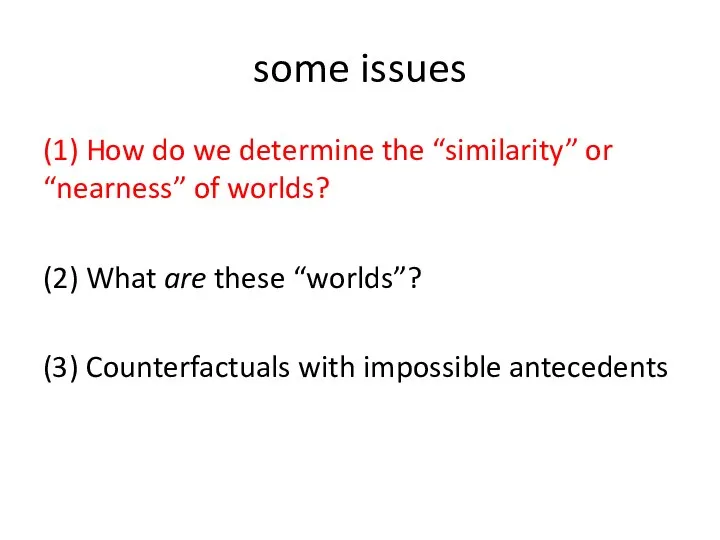
What are these “worlds”?
(3) Counterfactuals with impossible antecedents
Слайд 86Quine’s example (about Douglas MacArthur during the Korean War):
(p) “If Caesar were

in command, he would use the atom bomb.”
(q) “If Caesar were in command, he would use catapults.”
(Both seem true, or at least plausible.)
Слайд 87
What world are we talking about: a world very much like ours
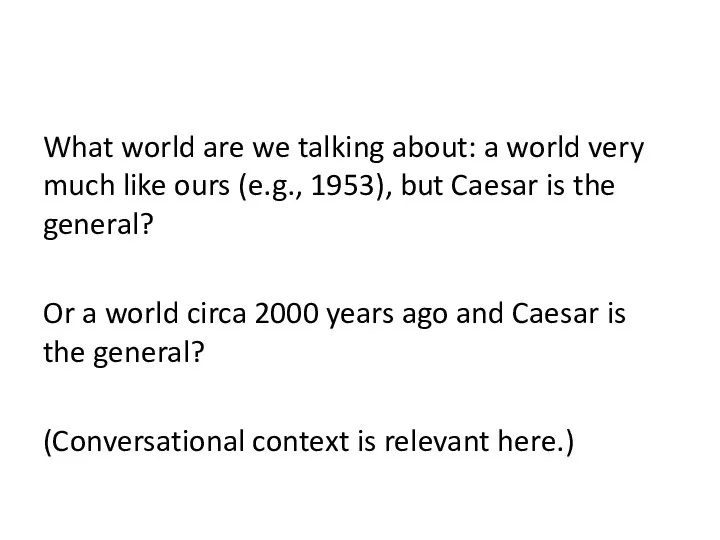
(e.g., 1953), but Caesar is the general?
Or a world circa 2000 years ago and Caesar is the general?
(Conversational context is relevant here.)
Слайд 88The “uniqueness assumption” was endorsed by Stalnaker but not Lewis.
It says that,
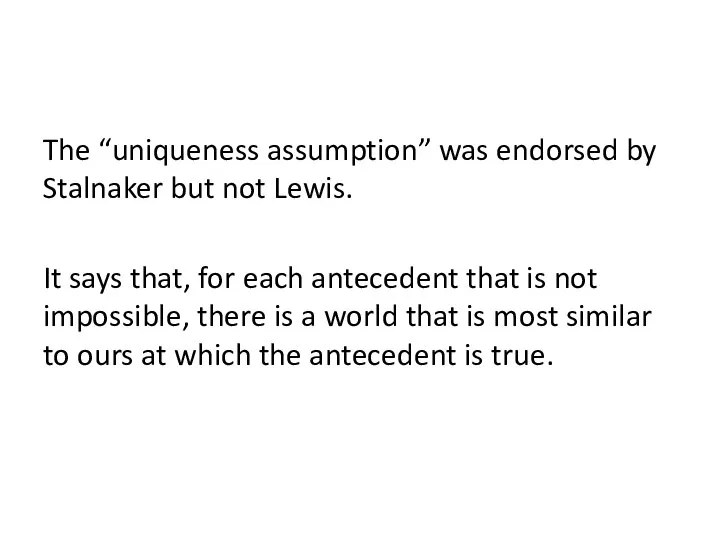
for each antecedent that is not impossible, there is a world that is most similar to ours at which the antecedent is true.
Слайд 89again from Quine...
(r) “If Bizet and Verdi had been compatriots, Bizet would
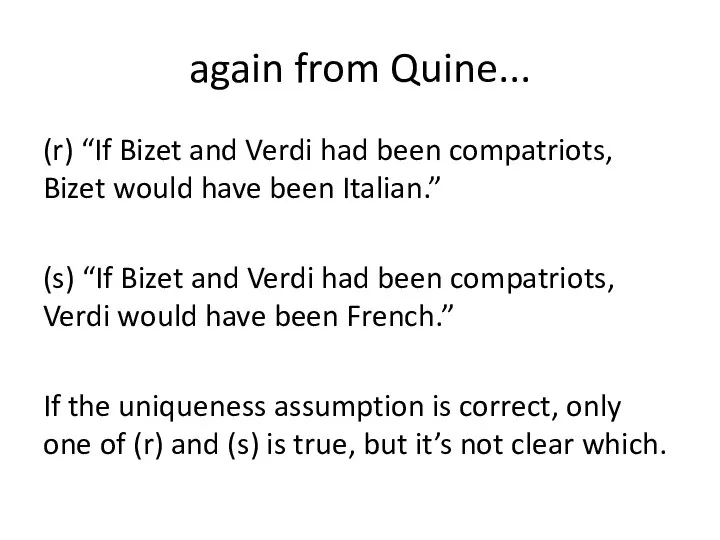
have been Italian.”
(s) “If Bizet and Verdi had been compatriots, Verdi would have been French.”
If the uniqueness assumption is correct, only one of (r) and (s) is true, but it’s not clear which.
Слайд 90some issues
(1) How do we determine the “similarity” or “nearness” of worlds?
(2)
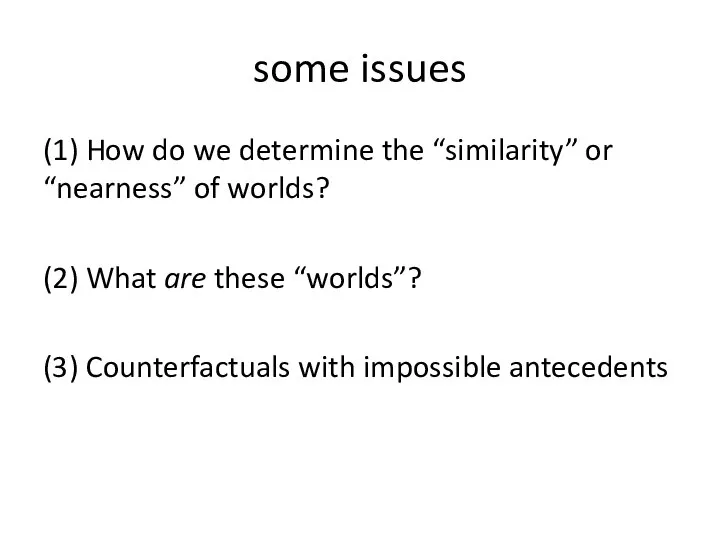
What are these “worlds”?
(3) Counterfactuals with impossible antecedents
Слайд 91some issues
(1) How do we determine the “similarity” or “nearness” of worlds?
(2)
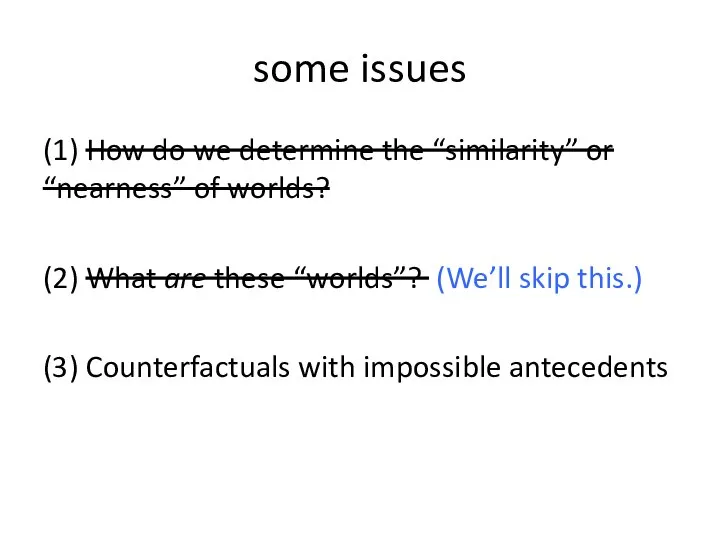
What are these “worlds”? (We’ll skip this.)
(3) Counterfactuals with impossible antecedents
Слайд 92some issues
(1) How do we determine the “similarity” or “nearness” of worlds?
(2)
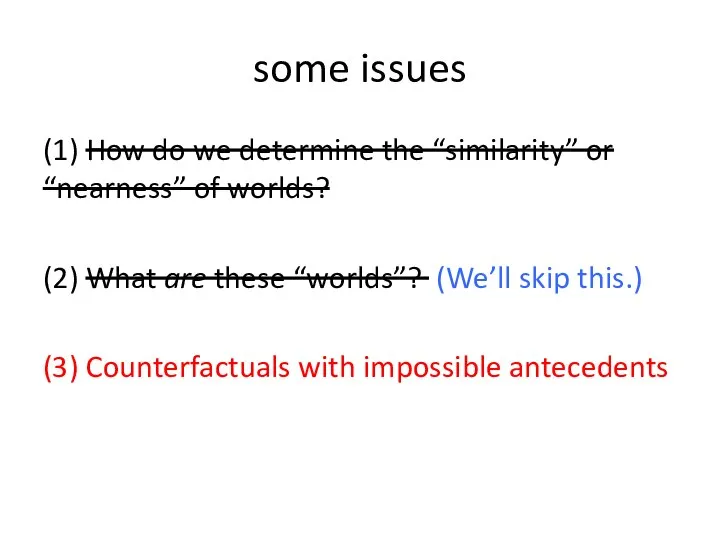
What are these “worlds”? (We’ll skip this.)
(3) Counterfactuals with impossible antecedents
Слайд 93squaring the circle
To “square a circle” is to use only a compass
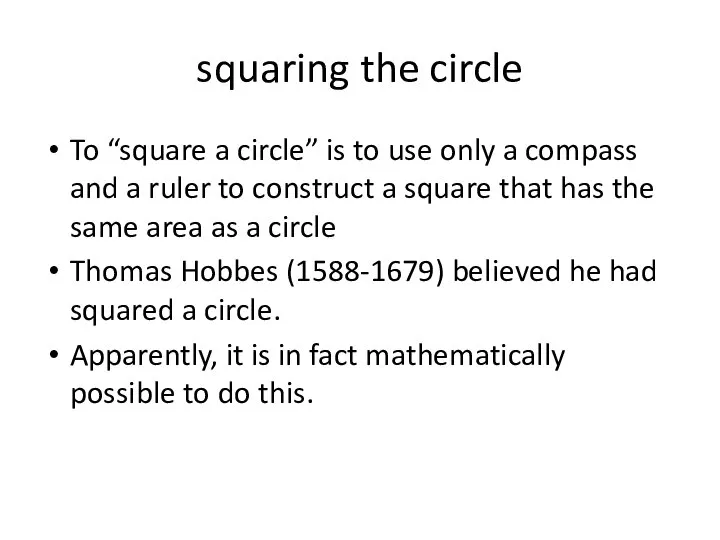
and a ruler to construct a square that has the same area as a circle
Thomas Hobbes (1588-1679) believed he had squared a circle.
Apparently, it is in fact mathematically possible to do this.
Слайд 94(t) “If Hobbes had squared the circle, he would have been a
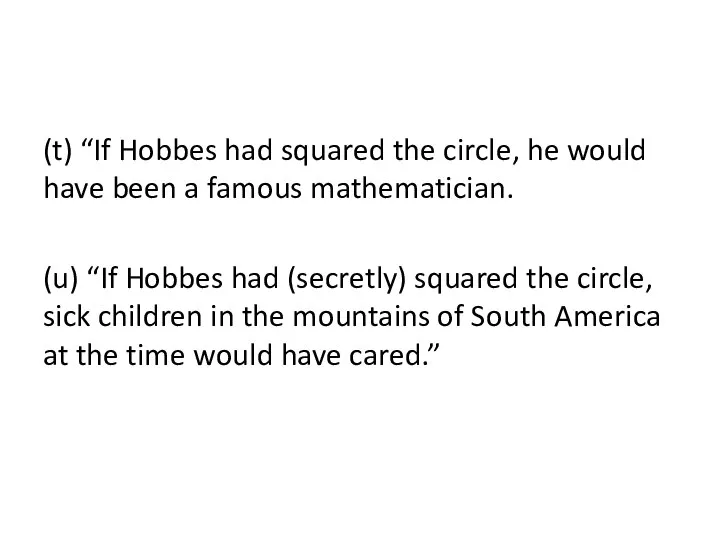
famous mathematician.
(u) “If Hobbes had (secretly) squared the circle, sick children in the mountains of South America at the time would have cared.”
Слайд 95Because squaring the circle is mathematically impossible, and because possible worlds must
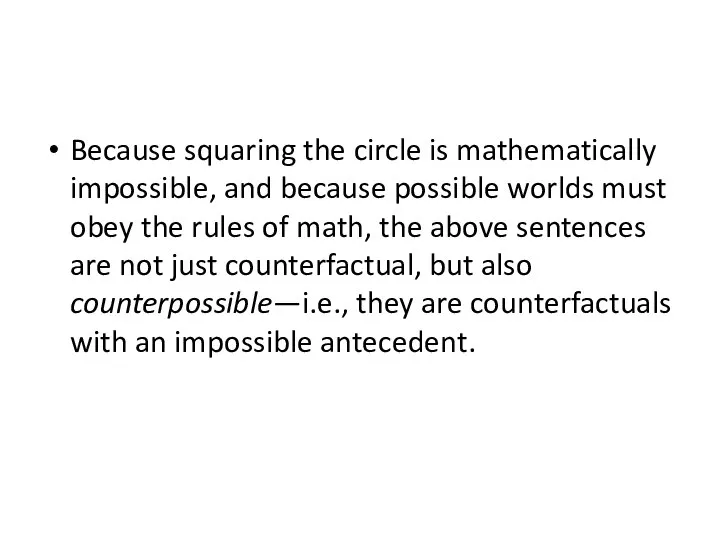
obey the rules of math, the above sentences are not just counterfactual, but also counterpossible—i.e., they are counterfactuals with an impossible antecedent.
Слайд 96So how do we check to see whether these counterfactuals are true,
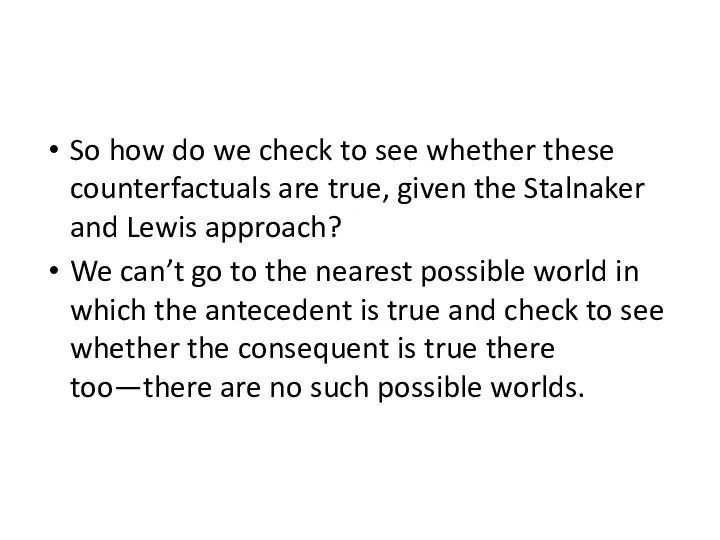
given the Stalnaker and Lewis approach?
We can’t go to the nearest possible world in which the antecedent is true and check to see whether the consequent is true there too—there are no such possible worlds.
Слайд 97Lewis (and others) thought counterpossibles are all vacuously true.
A lot of people
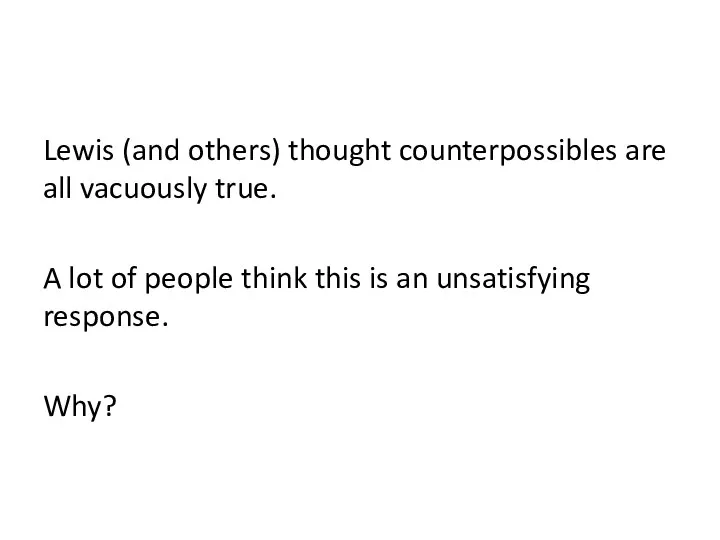
think this is an unsatisfying response.
Why?
Слайд 98(t) “If Hobbes had squared the circle, he would have been a
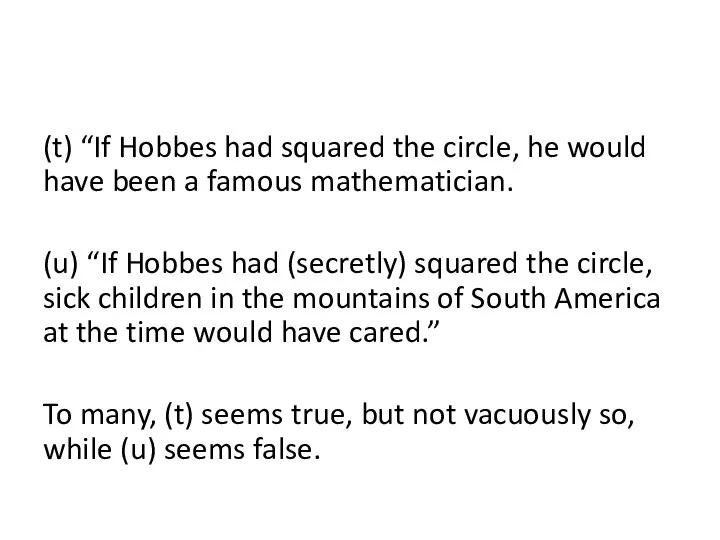
famous mathematician.
(u) “If Hobbes had (secretly) squared the circle, sick children in the mountains of South America at the time would have cared.”
To many, (t) seems true, but not vacuously so, while (u) seems false.
Слайд 99
So there are a number of people in philosophy who are trying
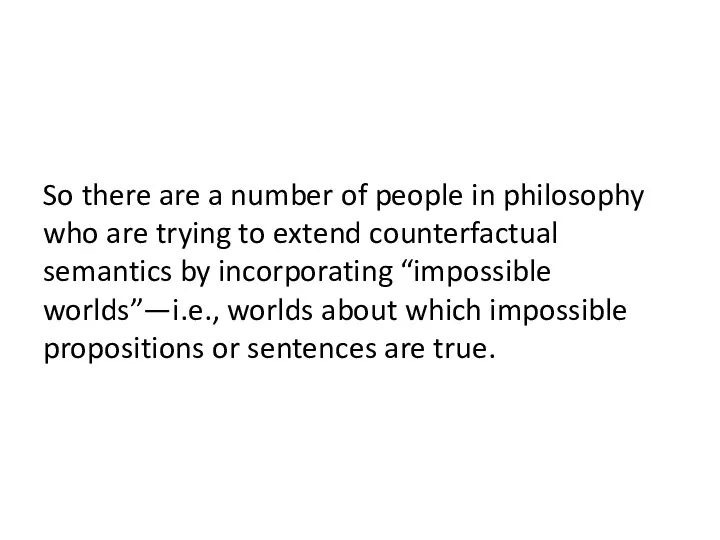
to extend counterfactual semantics by incorporating “impossible worlds”—i.e., worlds about which impossible propositions or sentences are true.
Слайд 101A lot of reasoning that we engage in occurs when we act
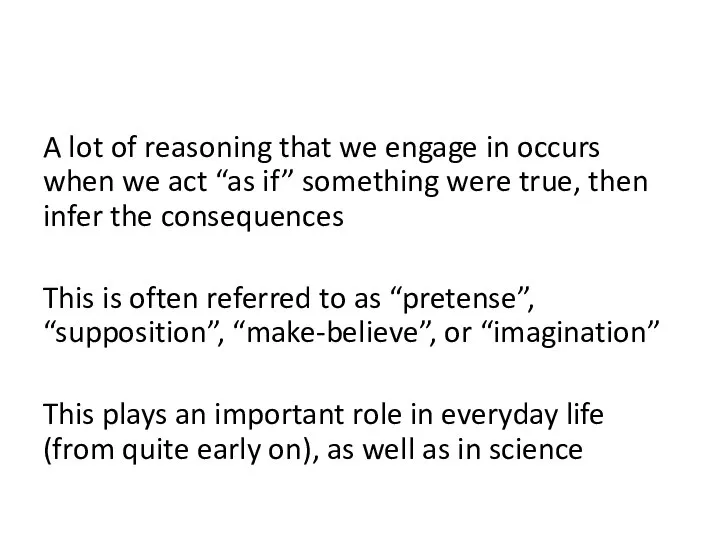
“as if” something were true, then infer the consequences
This is often referred to as “pretense”, “supposition”, “make-believe”, or “imagination”
This plays an important role in everyday life (from quite early on), as well as in science
Слайд 102“How is it possible for a child to think of a banana
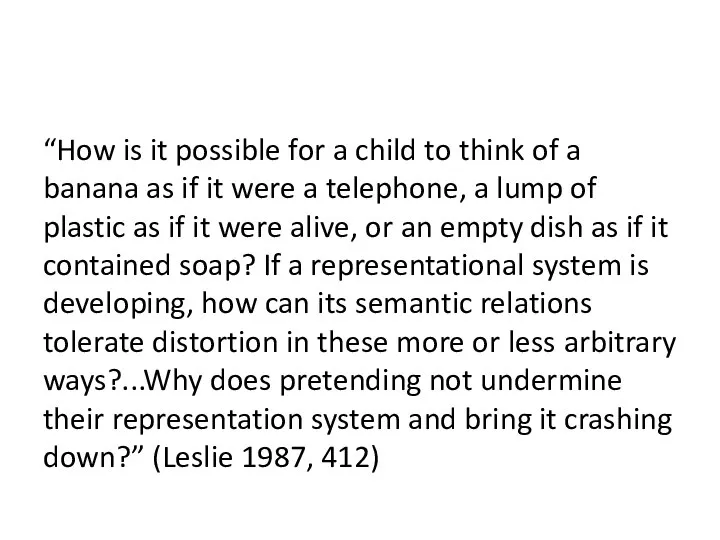
as if it were a telephone, a lump of plastic as if it were alive, or an empty dish as if it contained soap? If a representational system is developing, how can its semantic relations tolerate distortion in these more or less arbitrary ways?...Why does pretending not undermine their representation system and bring it crashing down?” (Leslie 1987, 412)
Слайд 103
Effectively, Leslie is asking how counterfactual reasoning in possible in young children?
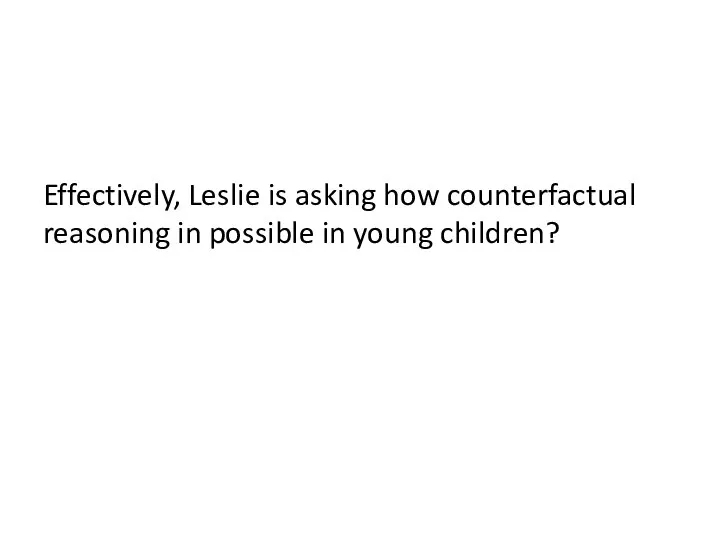
Слайд 104Consider Galileo...
How would a ball roll down this inclined plane if there
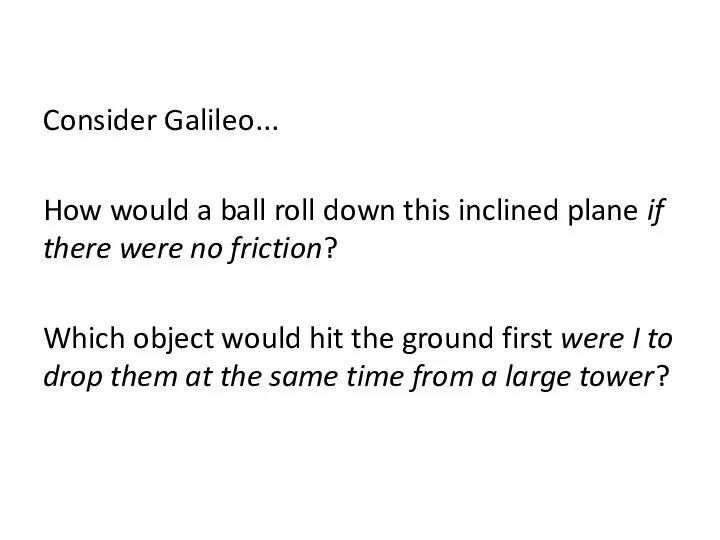
were no friction?
Which object would hit the ground first were I to drop them at the same time from a large tower?
Слайд 105Or Newton...
What would an object do were there no forces acting on
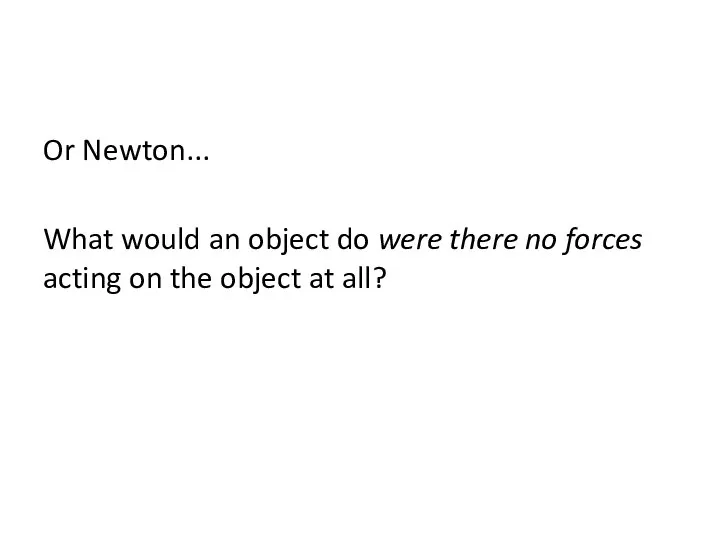
the object at all?
Слайд 106Another contemporary topic in philosophy (and cognitive science) is whether scientific reasoning
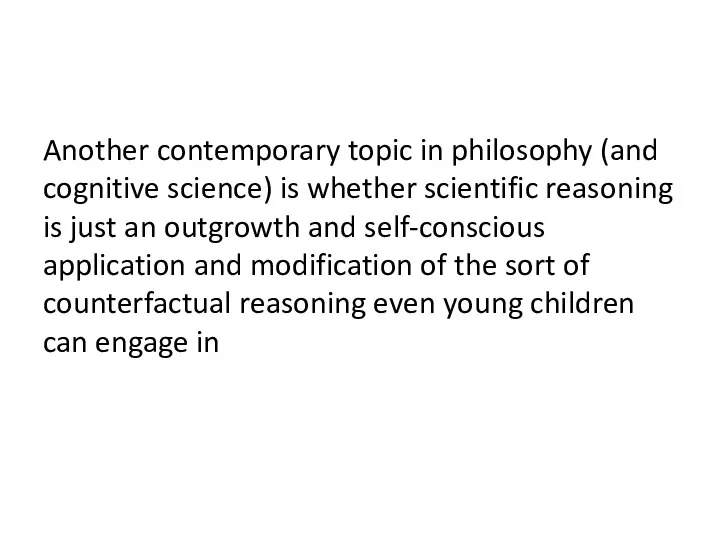
is just an outgrowth and self-conscious application and modification of the sort of counterfactual reasoning even young children can engage in






















































![~[L(G?C)] Assumption ~G negated conclusion ~[L(~G v C)] 1, implication M~(~G v](/_ipx/f_webp&q_80&fit_contain&s_1440x1080/imagesDir/jpg/1063625/slide-55.jpg)











































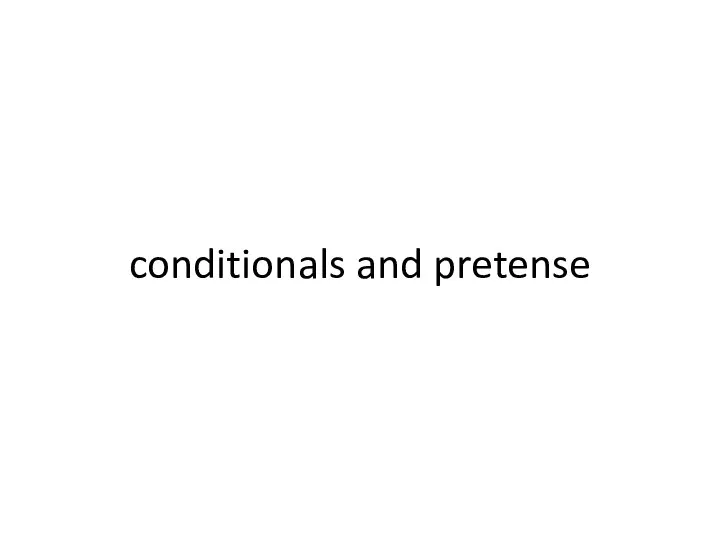






 Past Simple Irregular Verbs by helgabel
Past Simple Irregular Verbs by helgabel A magic island
A magic island Earth Day
Earth Day Learn the superlative adjectives and Present Continuous Show that you are the best!
Learn the superlative adjectives and Present Continuous Show that you are the best! Tools
Tools My favourite TV programme
My favourite TV programme Prefixes for adjectives
Prefixes for adjectives Naruto Game
Naruto Game This is my house 2
This is my house 2 Areas of London
Areas of London Let’s fly to… Encouraging young learners to read
Let’s fly to… Encouraging young learners to read Скороговорки
Скороговорки Закончи предложение
Закончи предложение “Oh, that seems weird” – образовательно-развлекательная программа
“Oh, that seems weird” – образовательно-развлекательная программа Царское село. Tsarskoye Selo
Царское село. Tsarskoye Selo Addition to 20
Addition to 20 Write in plural
Write in plural English phonetic contest
English phonetic contest Week 1. Lessons 1-2: Syllabus Introduction
Week 1. Lessons 1-2: Syllabus Introduction Устройство современного автомобиля
Устройство современного автомобиля Sweet juicy fruit
Sweet juicy fruit Past Simple. Простое прошедшее время
Past Simple. Простое прошедшее время The three wise men. Game
The three wise men. Game Презентация на тему Множественное число. Исключения
Презентация на тему Множественное число. Исключения  What Am I? ver 2
What Am I? ver 2 Тренировка звуков. (Часть 1)
Тренировка звуков. (Часть 1) Snow. Battle. Tenses
Snow. Battle. Tenses Tell your story
Tell your story